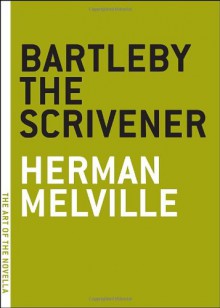
I read "Bartleby the Scrivener" as I was told it was a good introduction to Herman Melville because it was short, accessible and showed how ahead of his time Melville was.
All of those things turned out to be true but especially the last.
"Bartleby The Scrivener" was published in 1853, the same year that Dickens published "Bleak House". It's set in the offices of a commercial lawyer on Wall Street and tells the story of a scrivener, (a clerk who hand-writes multiple copies of long legal documents) who changes the heartbeat of his office by greeting all requests to leave his desk and or check the work of others with the phrase; "I would prefer not to, sir"
The opening of the story is very much of its time. The narrator sets about telling his tale much as he might if he was addressing members of his club over an after dinner brandy. There's lots of extraneous detail and the pace is unhurried and the path a little circuitous. Except that this conventional opening is less an attribute of Melville's approach to narrative and more a way of establishing the conventional, conflict-averse, unambitious nature of the narrator. It becomes clear that he is a man whose life has contained few challenges and who has a tendency toward the droll rather than the dramatic. His inability or at least unwillingness to confront Bartleby’s oblique refusals to comply with reasonable request to do his job provides the platform for the humour in the first half of the story. It is amusing but not very, by modern standards but it does cast a light on how offices then were run and the relationship between lawyer and clerk.
One thing that caught me by surprise was that the lawyer/narrator described Bartleby’s behaviour as passive aggression. Passive aggression is a familiar and often misused label today but it did not emerge as a clinical definition until ninety years after Melville wrote this story.
In the second half of the novella, the tone darkens, Bartleby's behaviour becomes more extreme and our lawyer/narrator moves from amusement through annoyance and finally arrives at sadness as it becomes clear how damaged Bartleby is.
It seemed to me that what initially appeared to be a lighthearted tale of office disobedience became something much more profound: a contemplation on our inability and or our unwillingness to recognise mental illness and shows how our reactions can swiftly move from sympathy to punishment if the behaviours of the mentally ill person challenge our worldview. Melville’s mild-mannered, educated and self-consciously charitable lawyer’s progression from amusement through to empathy is shaped by an only partly voiced concern that the behaviours of the mentally ill are somehow contagious (knowing that this is not true does not dissipate the lawyer’s fear but rather strengthens his worries about the fragility of his own mind.
I was impressed by Melville’s subtlety, by the amount of menace he managed to create in a tale that started off as mildly absurd and most of all for his view of mental illness.

 Log in with Facebook
Log in with Facebook 








